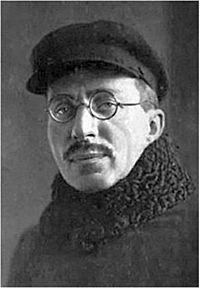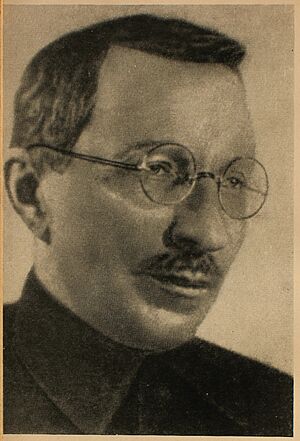Anton Makarenko facts for kids
Quick facts for kids
Anton Semenovich Makarenko
|
|
|---|---|
 |
|
| Born | Антон Семенович Макаренко 13 January 1888 Belopolye, Sumskoy Uyezd, Kharkov Governorate, Russian Empire (now Sumy Oblast, Ukraine) |
| Died | 1 April 1939 (aged 51) Golitsyno, Russian SFSR, Soviet Union |
| Occupation | Educator, writer |
| Language | Russian |
| Citizenship | Soviet |
| Subject | Educational theory, Pedagogy, Correctional education |
Anton Semenovich Makarenko (13 January 1888 – 1 April 1939) was an important Soviet educator and writer. He is known for his ideas about how to teach and raise children, especially in groups. He believed in democratic principles and involving children in their own learning and work.
After the 1917 Revolution, he started special homes for children who had lost their parents and were living on the streets. Many of these children were also involved in minor crimes. These homes, like the Gorky Colony and the Dzerzhinsky labor commune, helped them learn and grow.
Makarenko wrote several books. His most famous one, The Pedagogical Poem (also called The Road to Life), tells the story of the Gorky Colony. A movie based on this book, called Road to Life, was made in 1955. In 1988, UNESCO recognized Makarenko as one of the most important educators of the 20th century.
Contents
Biography
Early life and education
Anton Semenovich Makarenko was born in Belopolye, a town in what is now Ukraine, in 1888. His father, Semen Grigorovich Makarenko, worked as a painter at a railway depot.
Anton became a teacher at a young age, starting at 17 after finishing college in Kremenchug. He taught at a railway college near Kherson. He continued his studies and graduated with honors from the Teachers' Institute in Poltava in 1917.
Career
Makarenko continued his work as a teacher in Poltava. Later, in 1919, he became the director of a local college in Kryukov.
Gorky Colony
In 1920, Makarenko was asked to lead a special home for young people who had committed minor offenses. This place later became known as the Gorky Colony. It was named after the famous writer Maxim Gorky, who was very interested in Makarenko's work.
By 1925, the colony had 140 students, including both boys and girls. Makarenko believed in teaching children through work and self-governance. He wrote articles and gave public talks about his successful methods at the Gorky Colony.
Dzerzhinsky labor commune
In 1927, Makarenko became the head of another home for street children, called the Dzerzhinsky labor commune. This commune was near Kharkiv. It was known for helping even the most difficult young people.
Makarenko was very successful in gaining the respect of these children. He combined strictness with respect. He also made sure they received school education and learned useful skills through productive work.
Book publications
Maxim Gorky encouraged Makarenko to write about his experiences. Makarenko wrote The Pedagogical Poem, which is based on the true stories of his students. This book was published between 1933 and 1935.
Before that, in 1932, Makarenko's first story, "The March of the 30th Year," was published. In 1934, he became a member of the Soviet Union of Writers.
Brovary labor colony
In 1935, Makarenko started working for the NKVD in Kyiv. He became the Chief Assistant of the Labour Colony Department. In 1936, he was put in charge of another colony in Brovary. In less than a year, he helped turn a group of unruly students into a well-behaved and hardworking community.
In Moscow: writing and recognition
Makarenko later moved to Moscow. He continued to write important books. In 1937, his book The Book for Parents was published. This was followed by Flags on the Battlements in 1938, which was a sequel to The Road to Life. In February 1939, he received a high Soviet award, the Order of the Red Banner of Labour.
Death
Anton Semenovich Makarenko died in 1939 at the age of 51. He passed away on a train near Golitsyno, Russia. He was buried in Moscow at the Novodevichy Cemetery.
Legacy
Makarenko's ideas about education became very important in the Soviet Union. His colonies were seen as a great success in teaching and helping young people.
Some of his main ideas included:
- Treating each person with respect, while also having high expectations for them.
- Using positive peer pressure from the group to help individuals grow.
- Allowing the children's community to govern itself and manage its own activities.
Makarenko was one of the first educators to say that different parts of a child's life should work together. This included schools, families, clubs, and the wider community.
See also
 In Spanish: Antón Makárenko para niños
In Spanish: Antón Makárenko para niños
- Orphans in the Soviet Union
|


